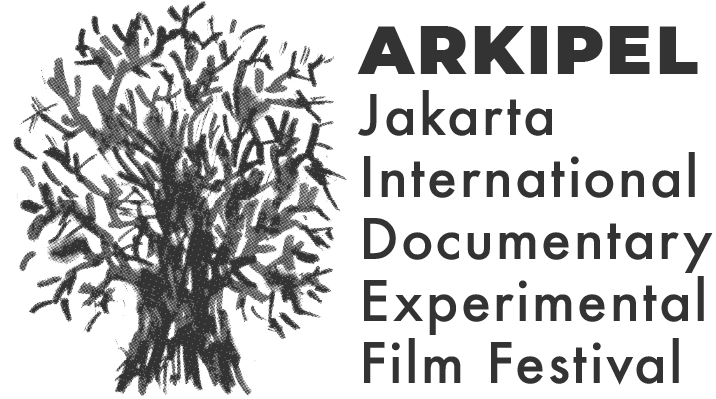Program Publik Master Class Jon Jost: “Saya tidak ada urusan dengan bisnis industri filem Hollywood”
Pembuat filem yang oleh ARKIPEL dianggap sebagai satu dari orang-orang yang paling berpengaruh dalam dunia film Independen Amerika, Jon Jost, hadir bercerita dan berbagi tentang banyak hal dalam Program Master Class, ARKIPEL Grand Illusion – 3rd Jakarta International Documentary & Experimental Film Festival, hari Rabu, 26 Agustus 2015 di @America, Pacific Place, SCBD Jakarta. Acara yang dimoderatori oleh Otty Widyasari ini dibuka dengan permintaan maaf dari Jon Jost tentang masalah kesehatannya yang sempat drop. Tidak aneh memang, pria kelahiran Chicago 72 tahun yang lalu dari lingkungan keluarga militer ini, tergolong sudah ‘sepuh’, namun tekadnya yang bulat untuk berbagi pengalamannya di festival filem ini layak diapresiasi.
Kesukaannya membuat filem sejak Januari, 1963, terjadi begitu saja, walau ia tidak pernah mengenyam pendidikan di bidang perfileman. “Saya dulu sekolahnya itu Arsitek 1 tahun, kemudian desain, tidak pernah sekolah filem, dan itu pun semua tidak selesai, alias drop out,” ujar pria penerima pertama penghargaan “John Casavettes Lifetime Achievement Award” di Spirit Award tahun 1991 bersama produsernya Ed Pressman. Lanjutnya, di tahun ‘60-an, saat dikeluarkan dari universitas bersamaan dengan waktu hangat-hangatnya berita akan terjadinya perang nuklir, beliau pun menjual buku-buku kuliahnya untuk pergi ke Selandia Baru. “Saya berpikir, kalau di belahan bumi Utara terjadi perang Nuklir, bumi belahan Selatan harusnya aman,” ujarnya sedikit berkelakar.
Ketika akhirnya perang nuklir itu tidak terjadi, uang hasil penjualan buku-bukunya sejumlah 800 dollar, ia belikan kamera seharga 500 dollar, dan sisanya ia pakai untuk melancong ke Eropa. Di Italia, tepatnya di Cassina Amata, dekat kota Milan, itulah Jon Jost membuat filem pendek pertamanya, berjudul Potrait (1963), yang berkisah tentang potret anak perempuan, Matilde Rebosio, dari keluarga yang menampungnya di sana. “Saat muncul facebook, saya sempat menemukan dia (Matilde—red), dan sudah berumur 62 tahun,” ujar Pria yang menikahi Marcella Di Pallo pada July 2005 ini.
Rentang masa sepuluh tahun ia habiskan untuk membuat filem-filem pendek dan video bergaya eksperimental. Baginya, rentang satu dekade itu adalah cara untuk belajar dan memahami proses teknis serta estetika sebuah filem. Di tahun 1971, ia pun pindah ke Oregon, USA, dan mulai membuat membuat filem feature panjang pertamanya, Speaking Directly (1974). “Dengan modal 6000 dollar, saya berhasil menjual filem itu seharga 12.000 dollar, ya untuk keberlangsungan hidup juga,” aku lelaki yang pada tahun Juli 2011 keluar dari pekerjaannya mengajar sebagai “Distinguished Professor” dari Universitas Yonsei, Seoul, Korea Selatan. Di era saat memulai membuat filem feature berdurasi panjang itu, beberapa media menyebutnya sebagai masa “Fiercely Independent Carreer” dari Jon Jost, bahkan salah satu filem feature-nya di tahun 1977, Last Chants for a Slow Dance, masuk ke dalam buku 1001 Films You Must See Before You Die (editan Steven Jay Schneider, pertama kali terbit tahun 2003).
Bercerita tentang bentuk filemnya sendiri, Jon Jost menjelaskan bahwa dirinya lebih suka membuat filem tanpa skrip. Ia menggangap filem tanpa naskah itu lebih bertualang. “Saya suka improvisasi dalam membuat filem, aktor hanya diberikan line-up saja. Lebih hidup rasanya. Kalau memakai skrip, terlihat seperti mesin fotokopi,” ujar Jon, yang sedang menyelesaikan filem esai terbarunya, Plain Song.
Menjawab pertanyaan terkait bentuk produksi filemnya yang ternyata juga diminati oleh bisnis filem Hollywood yang notabene sebagai pusat Industri filem dunia Jon Jost pun menjawab dengan tegas. “Saya tidak pernah nonton filem Hollywood, dan kebanyakan orang suka hal itu. Jadi kemungkinan besar mereka tidak suka filem saya. Tapi ternyata setelah ditonton ada juga kok yang suka.” Pernah suatu masa, ketika dirinya beralih ke filem digital di tahun 1996, ia mulai disisipi sisi kultural industri filem, banyak dari lingkungan sekitarnya yang mendorong ia agar terjun ke Hollywood, namun ia tolak mentah-mentah. “Saya tidak ada urusan dengan bisnis dunia filem Hollywood. Membuat filem seperti ini saja, saya sudah cukup senang.” Ia juga mengungkapkan, bahwasanya ia membuat filem untuk dirinya sendiri, terserah publik mau suka ataupun tidak. “Saya punya blog yang saya tulis sendiri. Di situ, biasanya saya mendapatkan feedback tentang filem-filem saya,” ujarnya menambahkan.
Pada sesi tanya jawab, Lasja F. Susatyo, sutradara filem Indonesia, Lovely Luna, bertanya mengenai hal mendasar mengapa seorang Jon jost bisa bertahan membuat filem hingga sekarang dan energi dari mana semua itu berasal.
“Sampai saat ini saya tidak tahu hal apa yang tidak menyenangkan dari membuat sebuah filem. Ya, hanya senang dan kesenangan,” jawab Jon, yang sampai saat ini telah mebuat lebih dari 70 filem. Dua film yang sangat terkenal hasil besutan sutradara Amerika ini adalah All the Vermeers in New York (1990) dan The Bed You Sleep In (1993).
Satu wejangan terakhir untuk peminat dunia filem dari Jon Jost adalah jika Anda hidup di era digital seperti sekarang ini, mulai gunakanlah perangkat gawai (gadget) Anda untuk mengambil gambar setiap hari. “Musisi yang baik adalah musisi yang menciptakan banyak lagu setiap tahunnya, begitupun dengan pembuat filem,” demikian Jon Jost membuat analogi. Ia menambahkan, bahwa keindahan bisa diciptakan dari hal sederhana dan ada pada diri kita.
Di tempat yang sama, Yuki Aditya, Direktur Festival ARKIPEL, mengaku merasa puas atas terselenggaranya program perdana untuk Master Class tersebut.
“Semuanya berjalan lancar dan sepertinya tujuan untuk ngedapetin crowd dari @america tercapai. Segmen dan jangkauannya juga jadi bertambah luas, bagus buat festival filem ini ke depannya,” ujarnya semangat.
–
A filmmaker who by ARKIPEL regarded as one of the most influential people in the world of independent film in United States, Jon Jost, came to share many things in Master Class Program, ARKIPEL Grand Illusion – 3rd Jakarta International Documentary & Experimental Film Festival, Wednesday, 26 August 2015 at @america, Pacific Place, SCBD Jakarta. The event was moderated by Otty Widasari, opened with an apology from Jon Jost about his health issues that once dropped. Not strange indeed, since this man who was born in Chicago 72 years ago from a military family, has been considered as an ‘elder’, but his strong determination to share experience in the film festival should be appreciated.
His passion to make films since January, 1963, just happened from nowhere, although he never sat on any film school. “I had one year in architecture school, and then went to design. But I never went to film school, and none of them were even completed” said the first recipient of the award “John Casavettes Lifetime Achievement Award” at the Spirit Award in 1991 along with producer Ed Pressman. He added, in the ’60s, when he got expelled from the university at the same time when news buzzing about the impending nuclear war, he was selling his college books to go to New Zealand. “I thought, if the nuclear war happened on Northern hemisphere, then Southern hemisphere should be safe,” he said jokingly.
When finally the nuclear war didn’t happen, from 800 dollars that he got from the sale of his books, he bought a 500 dollar camera, and used the rest to travel to Europe. In Italy, right in Cassina Amata, near the city of Milan, was where Jon Jost made his first short film, entitled Portrait (1963), which revolved around a portrait of a girl, Matilde Rebosio, from a family who took care of her there. “When facebook came, I found her one time (Matilde-red), and she was already 62 years old,” said the man who married to Marcella di Pallo in July 2005.
Span of ten years he spent to make short films and experimental styled videos. For him, the span of a decade was a way to learn and understand the process of technical and aesthetic of film. In 1971, he moved to Oregon, USA, and started making his first long feature film, Speaking Directly (1974). “With a budget of 6000 dollars, I managed to sell the film for 12,000 dollar. Well, for survival,” admitted the man who in July 2011 quitted from his job as a “Distinguished Professor” of Yonsei University, Seoul, South Korea. In the time when he started producing long feature films, some medias called this era as “Fiercely Independent Career” of Jon Jost, even one of his feature films in 1977, Last Chants for a Slow Dance, went into the book 1001 Films You Must See Before You Die (edited by Steven Jay Schneider, first published in 2003).
About the way of his films, Jon Jost explained that he would rather make a film without a script. For him, a film without a script was more adventurous. “I love to improvise in making a film, just giving the actors the line-ups. It was more lifelike. When you use a script, it looks like a copy machine,” said Jon, who is currently completing his latest film essay, Plain Song.
When being asked about his filmmaking style that is also in demand by the Hollywood film business-which is noted as the center of the film industry world- Jon Jost replied firmly. “I never watch Hollywood films, and most people like it. So most likely they don’t like my film. But after they watched, turned out, there are people who like it.” Once upon a time, when he switched to digital film in 1996, he’s being persuaded by people around him to go into Hollywood world, but he rejected them outright. “I have no business with Hollywood film industry. I’m happy just to make film like this.” He also said that he made film for himself, and it’s up to the public if they would like it or not. “I have a blog that I wrote myself. There, usually I get feedback about my films,” he added.
In the question and answer session, Lasja F. Susatyo, Indonesian film director for Lovely Luna, asked about a fundamental thing: what makes Jon Jost able to keep making films up to now and where are those energy came from.
“Until now I do not know what cannot be fun in making a film. Yeah, just fun and happiness,” said Jon, who until now has made more than 70 films. Two of most well-known films from this American director are All the Vermeers in New York (1990) and The Bed You Sleep In (1993).
One final advice to the film enthusiasts from Jon Jost is if you live in the digital age, as now, began to use your gadgets to take pictures every day. “Good musicians are musicians who created a lot of songs each year, as well as with the filmmaker,” said Jon Jost using an analogy. He added, that beauty can be created from simple things and in ourselves.
In the same place, Yuki Aditya, Festival Director ARKIPEL, claimed to feel satisfied with the premiere program for the Master Class.
“Everything went smoothly and seemed the aim to reach the crowd of @america succedeed. The segment and the range are also expanding, so it’s good for the film festival in the future,” he said excitedly.

